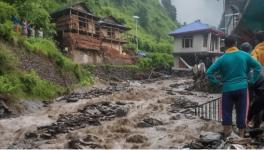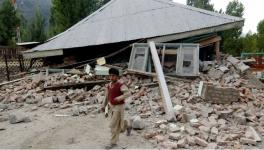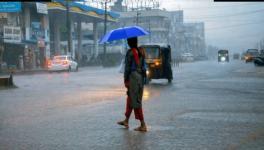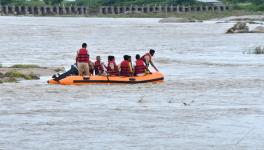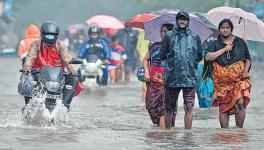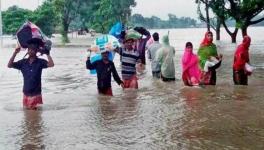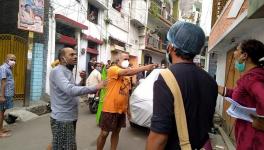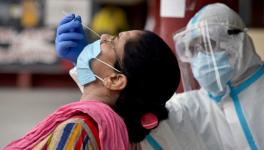Build Quarantine Centres Anywhere, Not in Universities

Image Courtesy: Wikipedia
On 19 March, the Telangana government declared its intention to take possession over the premises of the Maulana Azad National Urdu University, or MANUU, to develop it as quarantine centre for foreign travellers who may have been exposed to Covid-19 or Novel Coronavirus infections. The decision was taken under section 30 of the Disaster Management Act, 2005. As on Thursday night, the building had not been taken over, but university authorities had received intimation that it will be. This is a troublesome decision on many counts.
First, MANUU is a small residential university located in Telecom Nagar within the densely-populated Gachibowli suburb of Hyderabad. Spread over just over 200 acres, the students, staff and teachers of this university have been struggling, ever since it was founded a few years ago, against a lack of space. [Only by way of comparison, the Hyderabad Central University, a 15-minute drive away, is spread over 2,300 acres]. Other than the academic buildings of MANUU, a significant section of the teaching and non-teaching staff also reside within this tiny campus, and students reside in its hostels.
Second, even on principle, it is a controversial decision to put a university to use in fighting Novel Coronavirus It may be that, as a last resort, a government occupies a university. But as the students of MANUU have been saying since Thursday, they are not disposable entities who can be made to move out the moment there is a crisis.
It must be mentioned that the MANUU administration had decided on 16 March that students should vacate their hostel rooms by 20 March, Friday. This had already created a crisis as students scrambled to find alternate accommodations—many were unsuccessful. Yet, this was a precautionary step that took into account the crowded locality surrounding the university and the risk of infections spreading. Now, with the government preparing to take over the campus entirely, the hostel would have to be fully vacated, leaving no room for even a few students to isolate themselves in their rooms. The question is, where will the students who could not find accommodation go? And what happens to the non-teaching and teaching staff, and their families, who live on the campus of this residential institution? Would they not come under greater risk of exposure if a quarantine centre is set up right under their nose?
To move suspected cases and patients in and create an incubation centre on the premises of a residential university risks the health and safety of every family living on campus and those in the vicinity. Incidentally, the only specific reason mentioned in the government order as to why this university is a suitable spot is that it apparently has “ample place for parking of vehicles.” For these reasons, taking over MANUU is being seen as an irrational move.
Health experts have been saying that the incubation period of Novel Coronavirus is 14 days. Yet, the scourge is still new, and it is far from certain how long the virus can remain active outside a human host, and even how long it would take to incubate. There have been cases of outliers, in whom the virus is said to have taken 27 days to incubate. Because of the uncertainties surrounding the nature of this virus, MANUU students have been expressing concerns that their campus would not be a safe place to return to for a long time, and they would end up forfeiting an academic session.
The premise, in the case of Covid-19, is often that it is an affliction that harms the aged most. This is true, but does not imply that the young are completely insulated from it.
What seems to be missing in the government’s decision is an acknowledgement that policies that aim to address risks must take into account the differential impact and outcome of a disaster or potential disaster on vulnerable populations. This “vulnerability perspective” is rapidly emerging as a dominant view in the field of disaster management. Based on research into management tools, population density and social mores, the vulnerability perspective dictates that a real disaster takes place [only] when it strikes an underprivileged population. Therefore, the government must ensure a balance between its responsibilities towards the entire population and the socially-vulnerable communities who are part of it. In other words, a disaster is a time to take action but it is also necessary to build trust with communities while taking steps. Not measure must seem to be a tool to exploit the vulnerable (in this case students and those living near MANUU) in their weakest moments. Whether hidden or explicit, it is the task of disaster management to take into account vulnerabilities.
This is not to underestimate the scale of the health emergency confronting India, including Telangana. India must prepare itself to fight this scourge. But our efforts should be informed by the principle of proportionality. Accordingly, the government must first consider all available public and private hospitals and clinics and prepare them to provide quarantine suspected cases of Novel Coronavirus and cure patients. To turn a university into a quarantine centre reflects the misplaced priorities of the government and the administration. Why cannot it choose a space on the border of Hyderabad city? Facilities such as marriage halls can be taken over and there is no dearth of such buildings in Hyderabad, including some engaged in the field of healthcare and medical sciences and research.
The government should take a cue from MANUU’s administration, which had sensed a serious risk to the health of its students due to its location, and had not been holding classes. The Novel Coronavirus disaster is no earthquake, nor flood. Of paramount importance is the selection of a space which is large enough, and segregated, so that it does not pose the risk of becoming a centre to spread the epidemic. Besides, trust-building has to be done at the level of social intelligence. The government’s lack of social intelligence is obvious in this case, for it has decided to take over an institution dominated by minority students and staff. This could foster a sense of betrayal.
The Telangana government’s initiative may encourage other state governments and the Centre to follow suit. In multiple health crises in the past, mitigation was the result of cooperation between governments and people. Even now, the government must find other places to host travellers suspected of carrying Covid-19, not universities and educational institutions—not unless they are our final line of defence.
Tarushikha Sarvesh is an assistant professor of sociology, Advanced Centre for Women’s Studies, Aligarh Muslim University and Abdul Hafiz Gandhi is an assistant professor of law at Unity PG Degree and Law College, Lucknow. The views are personal.
Get the latest reports & analysis with people's perspective on Protests, movements & deep analytical videos, discussions of the current affairs in your Telegram app. Subscribe to NewsClick's Telegram channel & get Real-Time updates on stories, as they get published on our website.









